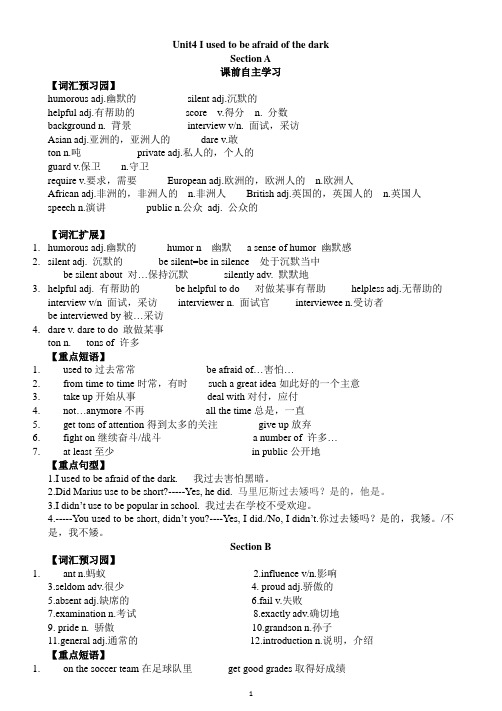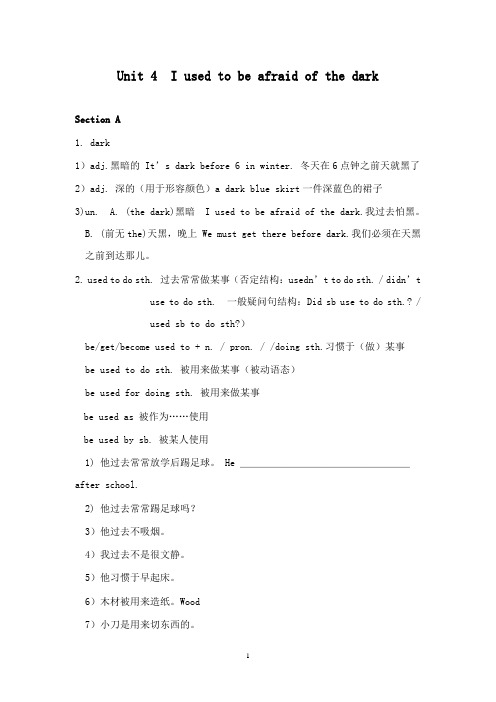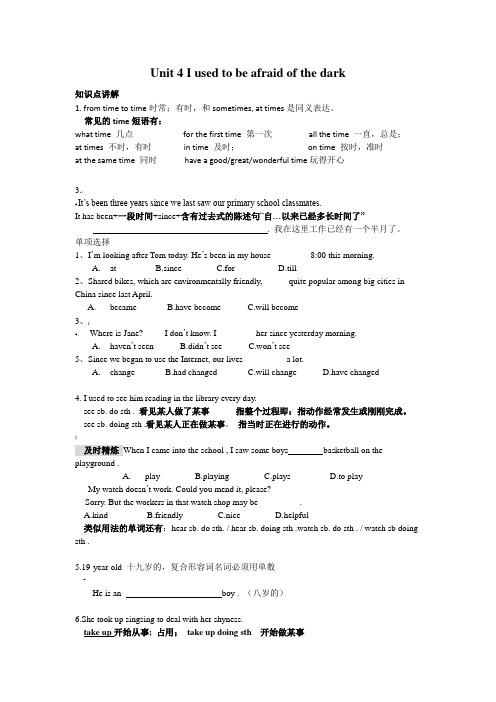九年级英语上册(人教版)Unit 4 I used to be afraid of the dark. Grammar Writing课件
新人教版九年级英语Unit 4 I used to be afraid of the dark

Unit4 I used to be afraid of the darkSection A课前自主学习【词汇预习园】humorous adj.幽默的silent adj.沉默的helpful adj.有帮助的score v.得分n. 分数background n. 背景interview v/n. 面试,采访Asian adj.亚洲的,亚洲人的dare v.敢ton n.吨private adj.私人的,个人的guard v.保卫n.守卫require v.要求,需要European adj.欧洲的,欧洲人的n.欧洲人African adj.非洲的,非洲人的n.非洲人British adj.英国的,英国人的n.英国人speech n.演讲public n.公众adj. 公众的【词汇扩展】1.humorous adj.幽默的humor n 幽默 a sense of humor 幽默感2.silent adj. 沉默的be silent=be in silence 处于沉默当中be silent about 对…保持沉默silently adv. 默默地3.helpful adj. 有帮助的be helpful to do 对做某事有帮助helpless adj.无帮助的interview v/n 面试,采访interviewer n. 面试官interviewee n.受访者be interviewed by被…采访4.dare v. dare to do 敢做某事ton n. tons of 许多【重点短语】ed to过去常常be afraid of…害怕…2.from time to time时常,有时such a great idea如此好的一个主意3.take up开始从事deal with对付,应付4.not…anymore不再all the time总是,一直5.get tons of attention得到太多的关注give up放弃6.fight on继续奋斗/战斗 a number of 许多…7.at least至少in public公开地【重点句型】1.I used to be afraid of the dark. 我过去害怕黑暗。
人教版九年级 Unit_4_I_used_to_be_afraid_of_the_dark_section (1)

教学过程一、复习与预习1、复习:讲解unit 3的布置的试卷和作业,达到复习上个单元知识点的目的;2、预习:听写unit4 核心词汇与词组,在此之前布置了学生在上课前去背诵好,听写后立刻批改,学生的错误及时指出,通过听写的方式,能起到很好的预习效果。
二、知识讲解知识点1:used to do 与be used to doing /be used to do 的区别1、uesd to过去常常例如:I used to go to work by bus. Now I take a taxi.我过去坐公交车上班,现在我搭出租车。
2、be(get/become)used to sth/doing sth 习惯于做sth例如:I used to go to work by bus, but now I am used to taking a taxi.我过去常常搭公车上班,但现在我习惯了坐出租车。
3、be used to do 被用来做例如:Wood can be used to make desk and chair.木头可以被用来做桌子和椅子知识点2:used to do 的否定、一般疑问句和反意疑问句形式used to作为情态动词时,可直接在used后加not构成否定式,直接将used置于句首构成疑问式,但与一般的情态动词不同的,它也可像普通动词那样借助助动词did构成否定式和疑问式:否定句:He usedn’t 〔didn’t use〕to come. 他过去不常来。
一般疑问句:Did you use to get up early in the morning? Used you to get up early in the morning?回答:Yes, I did. No, I didn't. Yes, I used. No, I usedn't反意疑问句:You used to go there,usedn’t 〔didn’t〕you?你过去常到那儿去,是吗?知识点3:unit 4重点短语from time to time 时常such a great idea如此好的主意take up 开始从事deal with 对付,应付not….any more 不再get tons of attention 得到太多的关注Fight on 继续奋斗a number of 许多at least 至少in public 公开地on the soccer team 在足球队里get good grades 取得好成绩be proud of 为。
【人教版】2020九年级英语全册 Unit 4 I used to be afraid of the dark Section A

Unit 4 I used to be afraid of the dark. Section Athe morning.让孩子们小点声,保持安静。
②silent “声音极小的、沉默的、寡言的”。
如:John is a silent,thoughtful boy. 约瀚是个不爱讲话,喜欢思考的孩子。
The house was silent because everyone was asleep.房子里很安静,所有的人都睡着了。
3. She still plays the from time to time. 她依旧不时地弹奏。
from time to time 为介词短语,意为“时不时地”。
同义词组为sometimes,at time。
例如:The temper gets the best of him from time to time. 他有时控制不住自己的脾气。
From time to time he fired questions at me. 他不时向我提出许多问题。
归纳有关time的短语:on time准时;in time 及时;all the time一直;kill the time 消磨时间have a good time玩得开心;once upon a time 从前;很久很久以前4. It’s been three years since we last saw our primary school classmates.距离我们最后一次见到小学同学已经三年了。
(1)该句型是:It is(has been)+时间+since+持续性动词的过去时,表示“自从……以来到现在已有多久。
”例如: It has been quite some time since I was last in London.我上次离开伦敦至今颇有一段时间了。
还可用于句型:It was+时间+since+持续性动词的过去完成时,表示“从……到过去某时间点以来”。
最新精编秋人教版英语九年级unit4《iusedtobeafraidofthedark.》知识点工作总结精品模板

Unit 4 I used to be afraid of the darkSection A1. dark1)adj.黑暗的 It’s dark before 6 in winter. 冬天在6点钟之前天就黑了2)adj. 深的(用于形容颜色)a dark blue skirt一件深蓝色的裙子3)un. A. (the dark)黑暗 I used to be afraid of the dark.我过去怕黑。
B. (前无the)天黑,晚上 We must get there before dark.我们必须在天黑之前到达那儿。
2. used to do sth. 过去常常做某事(否定结构:usedn’t to do sth. / didn’tuse to do sth. 一般疑问句结构:Did sb use to do sth.? /used sb to do sth?)be/get/become used to + n. / pron. / /doing sth.习惯于(做)某事be used to do sth. 被用来做某事(被动语态)be used for doing sth. 被用来做某事be used as 被作为……使用be used by sb. 被某人使用1) 他过去常常放学后踢足球。
He _________________after school.2) 他过去常常踢足球吗?3)他过去不吸烟。
4)我过去不是很文静。
5)他习惯于早起床。
6)木材被用来造纸。
Wood7)小刀是用来切东西的。
3. Don’t you remember me? 你不记得我了吗?(否定疑问句.根据事实回答)Yes, I do. 不, 我记得. No, I don’t 是的, 我不记得了4. wait a minute 等一等5. be more interested in 对…更感兴趣.6. be on the swim team = be a member of the swim team 在游泳队效力(是游泳队队员)7. sure1) adj.“确信的,确实的,一定……的”①be sure of sth确信某事②be sure+that从句:确信……③be sure to do sth必定会做某事2) adv ①无疑,确实②好,当然,没问题(用于应答)A.他深信自己会成功。
人教版九年级英语全一册Unit4_I_used_to_be_afraid_of_the_darkppt课件

3. I’m more interested in sports. be interested in 对……感兴趣
interested 主语是人 interesting 主语是物 .
Target Language: 1. I used to be short when I was young. 我年轻时个子很矮。
3. Are you still afraid of the dark? I’m terrified of the dark. (Section A 3b) afraid的词组有be afraid of sth 害怕某物 如:She’s afraid of dogs. He’s afraid of seeing strangers. 在口语中也说 I’m afraid he’s out at the moment. 我想他现在出去了。
6. Did you use to be afraid of being alone? 你过去害怕独自一人呆着吗?
Yes, I did. 是的,我怕。
7. I used to walk to school. 我过去走着上学。
be afraid of 害怕……, 后面可接名词、代词和动词-ing 形式。 例:Are you afraid of snakes? 你害怕蛇吗?
[单元课文重点分析] 1. I’m on the swim team. (Section A 2b) 我是游泳队成员。/我参加了游泳队. 类似的说法还有:I’m on the soccer team 或
I play on the soccer team.
2. People sure change. (Section A 2b) 人们的确是要变的。/人们肯定会变化的. sure在这里为副词。 如:It sure was cold. 天气确实很冷。
人教版英语九年级上册Unit-4知识点梳理及语法讲解

Unit 4 I used to be afraid of the dark知识点讲解1. from time to time时常;有时,和sometimes, at times是同义表达。
常见的time短语有:what time 几点for the first time 第一次all the time 一直,总是;at times 不时,有时in time 及时;on time 按时,准时at the same time 同时have a good/great/wonderful time玩得开心3.;4.It’s been three years since we last saw our primary school classmates.It has been+一段时间+since+含有过去式的陈述句“自…以来已经多长时间了”. 我在这里工作已经有一个半月了。
单项选择1、I’m looking after Tom today. He’s been in my house ________ 8:00 this morning.A.atB.sinceC.forD.till2、Shared bikes, which are environmentally friendly, _____ quite popular among big cities in China since last April.A.becameB.have becomeC.will become3、)4、---Where is Jane? ---I don’t know. I ________ her since yesterday morning.A.haven’t seenB.didn’t seeC.won’t see5、Since we began to use the Internet, our lives _________ a lot.A.changeB.had changedC.will changeD.have changed4. I used to see him reading in the library every day.see sb. do sth . 看见某人做了某事指整个过程即:指动作经常发生或刚刚完成。
人教版英语九年级Unit 4《I used to be afraid of the dark》全单元

人教版英语九年级Unit 4《I used to be afrd of the dark》全单元教学设计一. 教材分析人教版英语九年级Unit 4的主题是“I used to be afrd of the dark”,主要讲述了人们过去和现在的变化。
本单元包括两个部分:Part A和Part B。
Part A包含一个听力任务、一个口语任务和三个阅读任务,而Part B包含一个口语任务、两个阅读任务和一个写作任务。
教材内容丰富,旨在提高学生听说读写四项基本技能,同时培养他们的文化意识和跨文化交流能力。
二. 学情分析九年级的学生已经具备了一定的英语基础,能够运用所学知识进行简单的交流。
但是,他们在词汇、语法和听力方面还存在一定的困难。
因此,在教学过程中,教师需要关注学生的个体差异,充分调动他们的学习积极性,激发他们的学习兴趣。
三. 教学目标1.知识目标:学生能够掌握本单元的重点词汇和语法知识,正确运用一般过去时描述过去和现在的变化。
2.能力目标:学生能够在不同情境下运用所学知识进行听说读写操作,提高他们的语言运用能力。
3.情感目标:学生能够了解并尊重文化差异,培养跨文化交流的能力。
四. 教学重难点1.重点:本单元的重点词汇和语法知识,以及一般过去时的运用。
2.难点:一般过去时的运用,以及如何在实际情境中进行跨文化交流。
五. 教学方法1.任务型教学法:通过完成各种任务,激发学生的学习兴趣,提高他们的实践能力。
2.情境教学法:创设真实的情境,帮助学生理解并运用所学知识。
3.交际法:鼓励学生积极参与课堂交流,提高他们的口头表达能力。
六. 教学准备1.教师准备:备好相关教学材料,如PPT、听力材料、阅读材料等。
2.学生准备:预习本单元内容,完成相关的自主学习任务。
七. 教学过程1.导入(5分钟)教师通过提问方式引导学生回顾上一单元学过的内容,激发学生的学习兴趣。
例如:“Do you remember what we learned in the last unit? How was your weekend?”2.呈现(10分钟)教师通过展示PPT或实物,呈现本节课的主题“I used to be afrd ofthe dark”,引导学生关注一般过去时的运用。
新人教版九年级英语unit4_I_used_to_be_afraid_of_dark

I used to forget my mom’s birthday. I used to spit in the street. …… ……
Now
I kiss my mom and say “I love you” on her birthday. I become a volunteer in an environment group.
Li Wen’s unhappiness began to influence his schoolwork. He began less interested in studying.
He was absent from classes and failed his
examinations. Finally, Li Wen’s parents made
He Used to Cause a Lot of Trouble
Li Wen is a normal 15-year-old boy from the countryside. He works very hard and does well in school. It is hard to believe that he used to have difficulties in school. When he was a little boy, he seldom caused any problems, and his family spent a lot of time together. __________ C His parents moved to the city to look for jobs, and his grandparents came to take care of him. But he missed his parents so much and he often felt lonely and unhappy.
- 1、下载文档前请自行甄别文档内容的完整性,平台不提供额外的编辑、内容补充、找答案等附加服务。
- 2、"仅部分预览"的文档,不可在线预览部分如存在完整性等问题,可反馈申请退款(可完整预览的文档不适用该条件!)。
- 3、如文档侵犯您的权益,请联系客服反馈,我们会尽快为您处理(人工客服工作时间:9:00-18:30)。
used to后接动词原形, be used to 表习惯于, 后接动名词。
Practice
一、用所给词的适当形式填空。 to play (play) table tennis. 1. Lily’s father used ________ getting 2. Jane is a hard-working girl, she is used to _______
I didn’t use to be popular in school.
Did he use to be short? / Used he to be short? He didn’t use to be short. / He used not to be short.
You used to be quiet, didn’t you?
I used to be afraid of the dark.
我过去怕黑。
“used to + 动词原形”表过去的习惯或 过 去经常反复发生的动作或状态,但现在 已经不再存在了。可用于所有人称。
否定形式为:used not to + do 或:didn’t use to do 疑问形式为:Used … to …? 或:Did … use to …?
(get) up early. make 3. Wood is used to ______(make) desks, chairs, tables and so on. 4. ____ ____(use) to be short? Did you use used (use) in both work and 5. Today, computers are_____ study.
Unit 4
I used to be afraid of the dark.
Grammar & Writing
Grammar
Read the sentences below and pay attention to the underlined parts. You used to be short, didn’t you? Mario used to be ... Amy used to be ... Tina used to have ... He used to be really short. He used to be so shy and quiet.
二、按要求进行句型转换,每空一词。
1. My brother used to play football after school.(改为一 般疑问句) → ____your brother ______play football after school? Did use to 2. Tom used to be a quiet boy.(改为否定句) → Tom ____________ didn’t use to be a quiet boy. 3.There used to be an old hospital behind our school, ___________________ didn’t/usedn’t there ?(完成反意疑问句) 4. I used to see my aunt once a month.(对画线部分提问) → How ____________ often did you use to see your aunt?
你以前很文静,是不是? 反意疑问句: 陈述句, didn’t / usedn’t +
主语?
used to用法小结
ed to do sth. 表示“过去常常做某事”,只表示过
去和现在对比,暗示现在不做了。to为动词不定式符
号,后接动词原形。 e.g: 他过去常常六点去上学。 He used to go to school at six o’clock. ed to do sth.的否定形式:
主语+ usedn’t to do sth.
主语+ used not (didn’t use)to do sth. e.g: He usedn’t / didn’t use to smoke.过去他不吸烟。
ed to do的疑问句形式及其答语。 (1)Used+主语+ to do…? 回答:Yes, sb. used to./No, sb. usedn’t to. (2)Did+主语+use to do…? 回答:Yes, sb. did./No, sb. didn’t. ed to do的反意疑问句形式也有两种,类似于否定 句形式。 e.g. They used to see English movies on Sunday, usedn’t they?/ didn’t they?
— How does Jack usually go to school?
—He _____ D ride a bike, but now he _____
知识延伸: ① get/be used to (doing) sth.习惯于(干)某 事; ② be used to do sth.= be used for (doing)sth. 被用于做某事; ③ be used by 被……所用。
C He used to _______ in the sun, but now he is used to _______ at night.
三、选择正确答案。
—My aunt goes to climb mountains every Sunday. A —Oh! But she ________ hate climbing mountains. A. used to C. is used to B. was used to D. has used to
